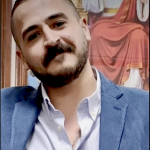By Coptic Solidarity –
This week, Coptic Solidarity led a coalition of organizations and experts dedicated to protecting and preserving the ethno-religious minorities of the Middle East and North Africa. The coalition included representatives and advocates from Assyrian, Alawite, Coptic, Druze, and Yazidi communities, alongside academic and policy experts.
Together, the delegation conducted high-level meetings with Congressional offices, the State Department, the U.S. Commission on International Religious Freedom, and hosted a Congressional Briefing on Capitol Hill titled Protecting Cultural Heritage: The Risks of a Politicized UNESCO.
Key Issues Addressed
1. Syria – The Deception of HTS and Al-Sharaa’s Rise
Participants highlighted the urgent need for U.S. policy reassessment in Syria, where minorities face the risk of being completely uprooted. Drawing on expert analysis, the coalition demonstrated how the ascendance of Ahmad al-Sharaa (formerly Abu Mohammad al-Jolani), leader of Hay’at Tahrir al-Sham (HTS), is not coincidental but the outcome of a deliberate deception strategy
HTS’s Playbook: Advised by jihadist scholars, HTS rebranded itself by (1) abandoning terrorist-linked names, (2) toning down rhetoric against Israel and the West, and (3) cultivating relationships with U.S. intelligence, even cooperating against rival militants.
- Facade vs. Reality: HTS successfully lobbied to have its terrorist designation revoked by the U.S. in July 2025—mere days before carrying out a brutal massacre in Suweyda that killed over 1,000 Druze civilians, burned 30 villages, and abducted over 100 women and girls. The same lobby whitewashed its role in the March coastal massacres against Alawites, months before the Suweyda violence.
- Implications: This dual identity—presenting moderation abroad while enforcing extremist violence at home—has confused international policy, emboldened other jihadist movements, and left minorities such as Druze, Alawites, and Christians gravely endangered.
2. St. Catherine’s Monastery – A UNESCO World Heritage Site Under Threat
Dr. Marc Porter, Advisor to St. Catherine’s Monastery, presented a statement from the Fathers of Sinai, warning of the existential threat facing the world’s oldest continuously inhabited Christian monastery.
- Autonomy at Risk: Founded in the 6th century, St. Catherine’s has enjoyed 1,500 years of autonomy under the Greek Orthodox Diocese of Sinai. Yet, Egypt has initiated legal proceedings to seize the monastery’s lands, library, and even relics
- Contradicting UNESCO Commitments: In its own 2002 UNESCO nomination, Egypt recognized the monastery’s independence. Today, Cairo’s legal maneuvers—expanded under then-Minister of Antiquities Khaled El-Enany—contradict those commitments and set a dangerous precedent for global heritage protection.
- Broader Pattern: These attempts reflect Egypt’s wider policy of centralizing religious authority, marginalizing independent voices, and exploiting heritage sites for political and economic gain.
- UNESCO Leadership Crisis: Egypt is now promoting El-Enany as the next Director-General of UNESCO. His direct involvement in cases undermining St. Catherine’s independence raises serious questions about UNESCO’s credibility should he assume leadership.
Why This Matters to the U.S.
- Religious Freedom & Human Rights: St. Catherine’s is more than a Christian heritage site—it symbolizes interfaith coexistence, housing both a church and mosque within its walls.
- Global Norms at Stake: Allowing HTS’s deception or Egypt’s expropriation to stand normalizes extremist violence and state appropriation of sacred sites.
- U.S. Leadership Needed: Congressional engagement can press the Administration to raise these issues with Cairo and at UNESCO, ensuring accountability and protection for endangered minorities and heritage.
Our Calls to Action
- Hold HTS and the Syrian regime accountable: Urge Congress and the Administration to ensure that sanctions target officials and entities complicit in atrocities against Druze, Alawites, Christians, and other minorities. Congress should press the Administration to close loopholes that have allowed HTS and its leader, Ahmad al-Sharaa, to consolidate power under the guise of moderation.
- Defend St. Catherine’s Monastery and global heritage: Call on the U.S. government and UNESCO to press Egypt to drop its legal claims against St. Catherine’s Monastery, explicitly reaffirm its historical ownership under the Greek Orthodox Diocese of Sinai, and establish binding protections and arbitration mechanisms to safeguard the monastery’s independence.
- Protect UNESCO’s credibility: Oppose Egypt’s candidate, Khaled El-Enany, for UNESCO Director-General, given his role in legal proceedings that undermine St. Catherine’s Monastery. Congress and the Administration should make clear that UNESCO must be led by someone with a proven record of defending, not politicizing, cultural heritage.





